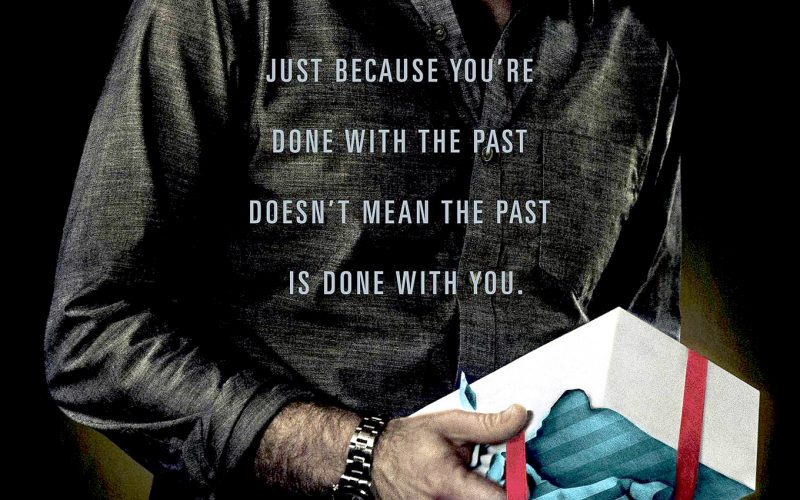Jason Bateman is one of America’s most underrated and consistent comedic straight-men, an actor whose sly, mocking tone and facial expressions are almost always employed to reflect off of his co-stars’ insanity.
It’s a trick he perfected as Michael Bluth in Arrested Development, a series which did something interesting deep into its run by making Michael a less and less sympathetic character, undercutting his need to help his family by revealing that need as a superiority complex which manifested itself as making sure that everyone around him needed him.
Joel Edgerton, the actor turned first-time writer/director, must be a huge fan of Jason Bateman, because he has written a film that perfectly toys with Bateman’s typical straight-man character by slowly poking holes in its veneer of sanity. He has written the role that Bateman was born to play. Edgerton has managed to deconstruct Bateman’s stock character and rebuild it as something dark and troubling, and it is fascinating to watch.
Bateman is matched, step-for-step, by his co-star, Rebecca Hall, who plays his suffering wife with just the right amount of empathy and growing anger. As an acting pair, the two are absolutely dynamite, by far the best thing about The Gift.
The movie surrounding them isn’t too shabby either, especially for a first-time director. The degree to which The Gift will successfully shock you depends, at least partially, on how many of those lousy mysterious-man-torments-family thrillers you’ve seen. The more, the better.
Early on, you would be forgiven for thinking that that’s just the kind of movie you’ve walked into, as Edgerton dutifully fills out the requisite beats. A young, promising couple, Simon and Robyn, (Bateman and Hall) are being shown a posh, modern home in a new neighborhood, clearly in love. A strange man shows up at the mall one day telling Simon that he knows him from high school, and then he slowly begins interfering in the couple’s lives. Thankfully, the film is laser-focused. After a quick opening scene showing the impossibly perfect couple picking out their new home, the film immediately cuts to Joel Edgerton himself, playing Gordon (not-so-affectionately nicknamed Gordo, and Weirdo by Bateman).
The Gift’s first 30 minutes are chock-full of cliches, which bothered me at the time but later show themselves to be table-setting, lulling the audience into thinking they are watching a run-of-the-mill thriller only to rip the tablecloth off near the end. Gordo oversteps his boundaries slowly, eliciting annoyance from Simon to the dismay of Robyn, who sees him not as a threat but as a poor, lonely, pathetic man who has nothing else. Sprinkled in are some of those classic fake-scare shots, such as a scene of Gordo appearing just behind the fogged glass of Robyn’s shower only to turn out to be a dream.
All of these devices are cheap ways to build tension that have been abused for decades by horror films. However, their cheapness in effect only helps to convince the audience that the only thing to fear is the same thing that they fear every time they see a thriller in this vein, which is a scary man with a weapon. Spoilers in this movie are deadly to its charm, so I’ll keep things vague: The Gift turns itself on its head in its last half hour, forcing you to question your alliances, your prejudices, and your judgment of morality. Most of all, it shows itself to be a more subtle thriller than the one it parades as early on. Bateman’s character is at the center of it all, gaining layers throughout.
The early scenes make the audience complicit with Simon. What do we have to go off when judging the bad guy in a movie? A few short scenes? That black-and-white mentality is put under the magnifying glass and complicated in The Gift. Luckily for the viewer, this idea leads to one of the more memorable pulp thrillers I’ve seen in years.
The Gift would elicit a higher score if it weren’t for its big reveal in the final minutes. Until that point, the tension has ratcheted up to an admirable degree, and I was breathless with anticipation as the final “gift” was being unwrapped. What is contained in that gift is as dark a turn as you could expect, and it seems a bit tonally jarring compared to what came before it.
Still, The Gift ends with the audience not sure who to trust, or who to root for, and the pit I could feel in my stomach as the credits rolled is all the convincing I need that Edgerton has achieved what so few studio thriller directors can achieve: a lasting, genuine sense of unease. The movie has its rough spots and imperfections, but Bateman’s performance does not. The Bateman stock character will never seem as innocent again, no matter how innocuous the movie that features him is. Maybe a straight-man is just a straight-man because he’s convinced himself that he’s the only one that’s not a weirdo.
**** out of *****




